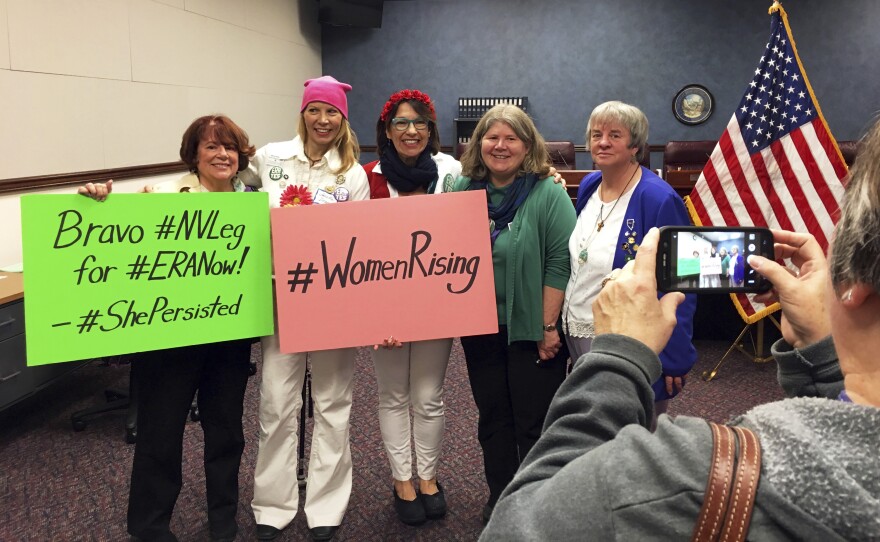Illinois is once again in the spotlight as advocates seek to revive efforts to pass an Equal Rights Amendment to the U.S. Constitution after it narrowly missed being ratified in the 1970s.
Back then, Illinois played a pivotal role in the ERA's defeat. It was one of the final three states needed to ratify the amendment, and it was the only northern state that failed to approve it. Thirty-eight states are needed to ratify a constitutional amendment, and 36 have done so. Advocates hope Illinois will now be one of the final two.
Sally Pancrazio is co-chair of local efforts to support the ERA. Speaking on GLT's Sound Ideas, Pancrazio said the amendment isn't merely symbolic, or only a women's issue. It is a necessary measure to assure equality under the law for both sexes, she said.
"The Equal Rights Amendment guarantees men and women will have equal rights under the law. The United States is one of seven countries on our globe that does not have such a guarantee," Pancrazio said.
"The Equal Rights Amendment guarantees men and women will have equal rights under the law."
Pancrazio said neither the 14th Amendment, which provides for equal protection under the law and formed the basis for the marriage equality Supreme Court ruling, nor the federal Civil Rights Act of 1964 specifically guarantee equal gender rights.
"Supreme Court Justice Ruth Bader Ginsberg has tried to use the 14th Amendment to assure that men and women have equal rights. However, the rest of the court has not agreed with her," Pancrazio said.
The late Justice Antonin Scalia once wrote that the Constitution "neither requires discrimination nor prohibits it," said Pancrazio, a former dean of Illinois State University's College of Education.
"The Civil Rights Act assures equal protection regarding race, ethnicity, national origin and a couple of other categories, but it does not apply to gender," Pancrazi added.
She said the ERA provides important protections for men as well as women, citing a common practices in courts to favor the mother over the father in custody cases involving children.
Clearly, however, the amendment would provide significant added protections for women. Women continue to earn 77 cents for every dollar men earn. They lag in top managerial positions and seats on corporate boards.
Women often pay higher insurance premiums and have a tougher time qualifying for mortgages and other loans.
Illinois already has a Equal Rights Amendment in its state constitution. It says "equal protection under the law shall not be denied or abridged on account of sex by the state or local government and school districts." The issue now is whether Illinois will support the federal amendment.
It was an Illinois resident, the late Phyllis Schlafly of Alton, who played a major role on the national stage in defeating the proposed U.S. amendment in the 1970s.
"She was a very successful, articulate, intelligent woman," Pancrazio said. "She had been a spokesperson for very conservative campaigns at that time."
With the support of the Catholic Church, Schlafly, an attorney and mother of six, tied the ERA to the reproductive rights movement then in high gear.
With her organization, the Eagle Forum, she mobilized a large segment of Catholic women across the country who opposed the Roe v. Wade Supreme Court decision on abortion to fight against the ERA as well.
But Pancrazio said connected the two issues distorted the purpose of the ERA.
"For those folks, the connection for reproductive rights and equal rights, those issues got lumped together. Even today we hear that reproductive rights get connected to the Equal Rights Amendment. There are other pieces of legislation that do deal with reproductive rights. The Equal Rights Amendment does not."
Schlafly also argued that if the ERA passed, it would lead to women serving in combat and having greater access to birth control and abortion. Most of her concerns have now come to pass.
"Societies change, cultures change, believing that people do have choices rather than being a function of biology, that biology is destiny and our roles are predestined for us," Pancrazio said.
Pancrazio said several local organizations are supporting the effort to ratify the ERA and that it has turned into a bipartisan effort with both Democratic and Republican women involved in the effort.
Some opponents argue that advocates can't simply pick up the battle where they left off in the Seventies. However, Pancrazio said there is precedent in states ratifying at least one other Constitutional amendment decades after it was first introduced.
A kickoff event to raise awareness of the ERA will take place Thursday from 7 to 9 p.m. at the Hyatt Place Hotel in Uptown Normal. The event includes presentations by speakers, musical performances and refreshments. Tickets are $30. There's more information at BloNo4ERA.org.
WGLT depends on financial support from users to bring you stories and interviews like this one. As someone who values experienced, knowledgeable, and award-winning journalists covering meaningful stories in central Illinois, please consider making a contribution.




